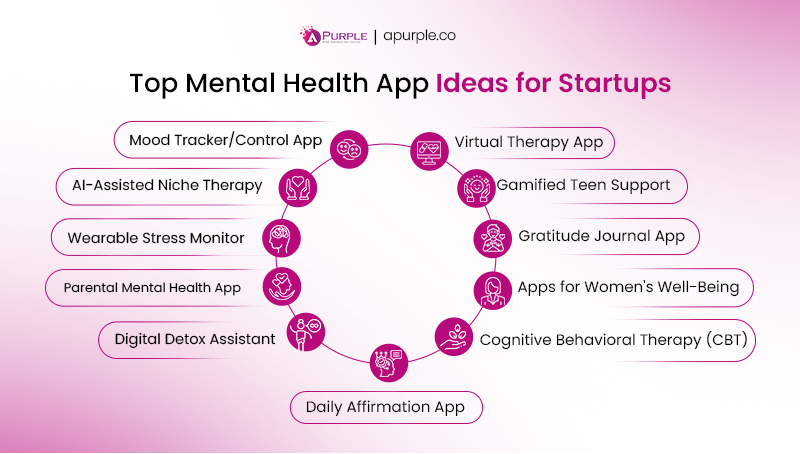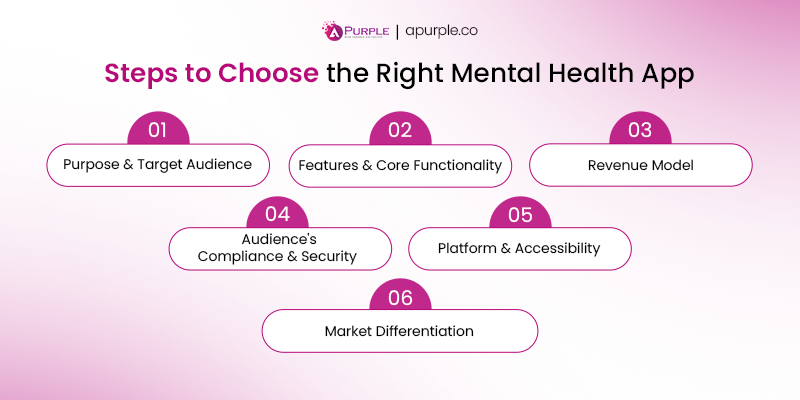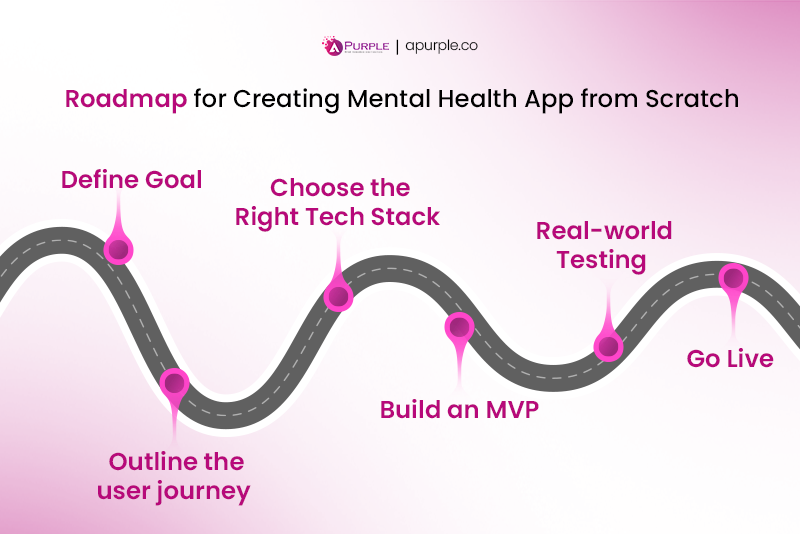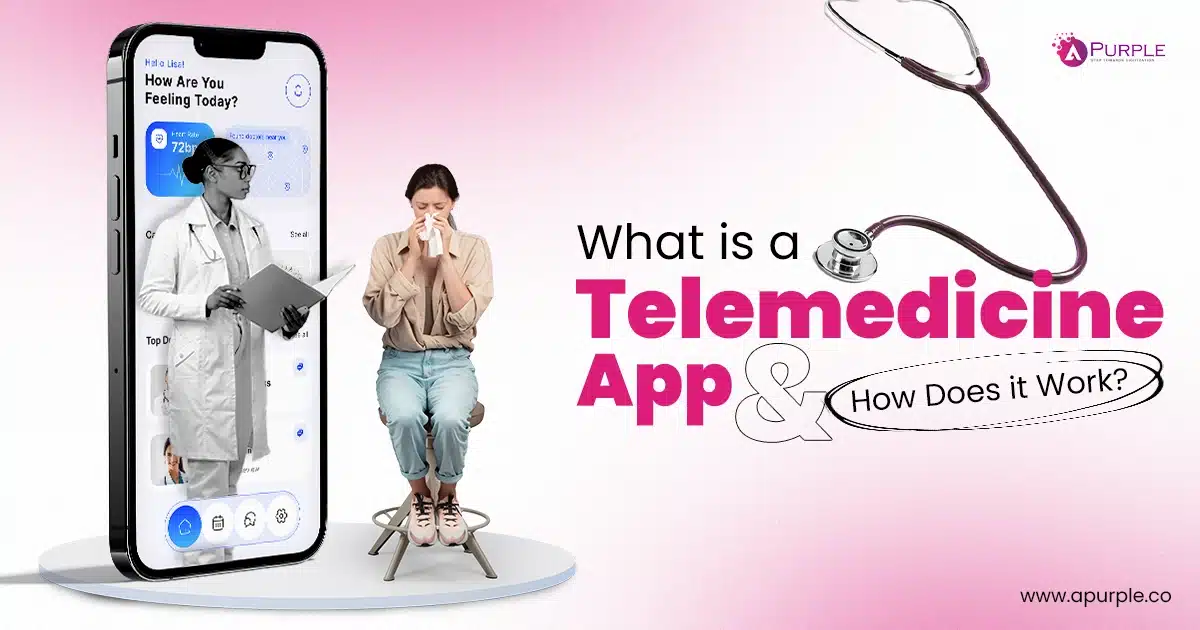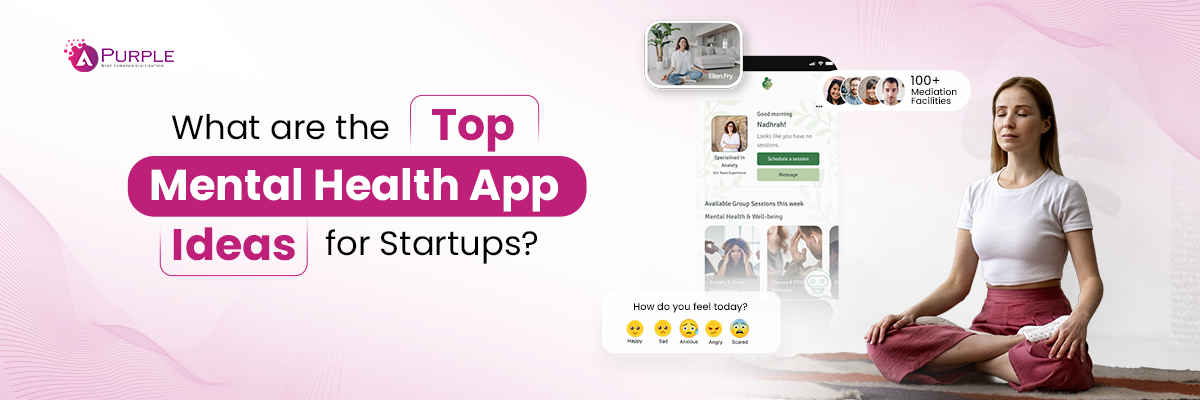
Blog Summary: The increasing mental health conditions like depression, stress, and tension are at an all-time high. The majority of people look for mental healing apps now to get rid of these conditions. Well, you can address such serious concerns with an app development solution. Based on the recent analysis, there are different mental health app ideas for startups. This way, you can take noble initiative to help the audience with a mental well-being app solution. Discover the detailed dynamics in the blog!
For mental health professionals and consultants, the major problem comes in gaining patients’ trust. Depression, anxiety, and stress concerns are rising rapidly. As these mental health concerns are very crucial cases, handling them needs utmost care. Accordingly, even if you made them available the right treatment at clinics, people are hesitant to discuss this with doctors or consult therapists. That’s why they prefer the digitized form (mental health apps), and its usage is booming.
Apps like BetterHelp, Calm, and Headspace have become the savior or secret therapist of people dealing with depression or anxiety. Being a therapist or health institute, you can become their go-to mental healing and wellbeing guardian. Just mark your entry as a startup mental health app. This blog has everything about this app type and how you can excel with this idea!
What does a Mental Health App Do?
A mental health app is a digital platform thatassesses, prevents, supports, and regulates different aspects of mental wellbeing. These apps help people/users manage stress, anxiety, and depression. Thus, it can build healthier habits through various features such as personalized recommendations, chat support, therapy sessions, and more.
Additionally, the demand for mental mobile app development solutions amongst health professionals is increasing gradually. Further, you will have the forecast on how bigger it’s becoming. So, keep reading…
How Big is the Mental Health Apps Market?
It is huge and expanding seamlessly in the recent marketplace. You can make a better grasp of this extended demand. Accordingly, the innovative mental health app ideas for startups make deeper and more profitable means. A recent report says that the mental health app market share is expected to increase to USD 35.29 billion by 2034.
The figure proves the influence of depression, anxiety, and a stressful lifestyle. Therefore, it’s high time to address this condition and transform your startup business idea. We know you are having numerous queries about the type, how it will work, and most importantly, how much does it costs to make a mental health app… So, here you have the detailed outlook on a trending mental health app for startups.
11 Reliable Mental Health App Ideas for Startups like You!
1. Mood Tracker/Control App
Today, most people respond and interact depending on their Mood. Various external and internal factors affect mood. If people are not in a good mood… it will trigger the joke as provocation. Why are we mentioning this? Because the mood game can make you amplify into a mental health mobile app idea.
Developing a mood tracker app is a highly recommended solution for startups. You can begin by focusing on user-friendly features. From enabling users to log their feelings throughout the day using colors, emojis, tags, or custom notes, you can offer a personalized experience. So, the daily mood controlling app examines the patterns and is essential in the current lifestyle.
How do Mood Tracking Apps Work?
Well, the major functionality of a mood tracker or control app is bridging the connection between the user and the app. It asks users about their behavior and personality-related questions and evaluates the data. Accordingly, such a mental wellness app recognizes users’ triggers for stress and anger. Moreover, you can make your app stand out by enabling it to suggest methods/ways to cope with the mood swings.
Why Good for Startups?
- Low development complexity: great for MVP
- High versatility (can expand with AI features or CBT)
- Appeals to both B2B and B2C
Mood Tracking App Cost Estimate:
USD 10,000 to USD 50,000+
Real-World Example: Moodfit
2. AI-Assisted Niche Therapy
The second great mental health app idea is AI-assisted therapy solutions. As the name suggests, it uses artificial intelligence to support and guide users facing mental health challenges. Developing an AI-based mental health app gives your startup business early growth metrics. It is an app that offers immediate and reliable assistance and is driven by human therapists. Let me go through its functionality.
How does the AI Therapy App Work?
AI-driven niche therapy app provides users instant, judgment-free assistance. It operates as their AI companion for tough times. Even if users are dealing with late-night anxiety outbreaks, stressful commutes, or nervous moments, AI chatbots powered with human therapists assist smartly. Therefore, it’s a great aspect for an AI startup idea, isn’t it? You can serve users who find themselves alone in challenging times. So, it’s a noble concept as well. The following details will help you develop a mental health app idea.
Why Good for Startups?
- Best for MVP development
- Integrates easily with other tools
- Future-proof technology
AI-Assisted Niche Therapy App Cost:
Basic MVP Cost: USD 10,000 to USD 40,000+
Advanced Version with AI Tools
: USD 70,500 to USD 150,000+
Real-World Example: Wysa
3. Wearable Stress Monitor
Another favorite and widely used one is the Wearable Stress Monitor app. Yes! You got this correct… It’s the app enabled on your smart watch that keeps track of various body parameters. Wearing smart watches is common, from step count to heart rate check, it monitors your body activities with diverse features. Compiling these with new-age stress monitoring is what creates a unique impact. Oversee its core performance, so you can analyze why it’s meant for your startup.
How does the stress monitor app work?
Wearable stress monitor apps undertaking your body signals like Heart Rate Variability (HRV) and Resting Heart Rate (RHR) through the sensors. Consequently, it tracks the stress level on a real-time basis. Even for fitness app development, this stress monitor integration is a plus point. Moreover, this mental wellness app represents the daily stress score and identifies the patterns that spike the stress graph.
In addition to this, you can cover your app with customized suggestions on the high-stress score days. For example, sending them push notifications on taking breathing exercises or meditation tips. Hence, it is a favorable mental health app idea for your startup.
Why does it suit your startup’s idea?
- In-Demand & widely used
- Captivates vast smartwatch wearers
Wearable Stress Monitor Cost Estimation:
USD 10,000 to USD 50,000+
Real-World Example: StressWatch
4. Cognitive Behavioral Therapy (CBT) App
Developing and deploying a mindfulness therapy-based app is a basic essential in today’s world. Cognitive Behavioral Therapy (CBT) apps are an integral part of mental health app startup ideas aligned for your business. It is the major market scope nowadays to keep an eye on mental wellbeing. Moreover, these apps track habits, thoughts, and emotional challenges, and even offer coping skills or therapies. You can evaluate its primary features, which help in CBT app development, for your digital business.
How does CBT actually work?
CBT is a mental wellness mobile app that provides help and relaxation, offering solutions. As you build a CBT app, it must encompass an interaction-driven layout that is aware of the user’s habits and behaviors. In addition to that, it focuses on users’ negative thought processes and provides solutions. So, this app drives users to become their own therapists, unlike the AI-assisted therapy app.
Why Efficient for startups?
- Highly scalable with minimal human resources
- Adaptable across different niches
- Ideal for B2B and B2C expansion
Cognitive Behavioral Therapy App Development Cost:
USD 10,000 to USD 70,000+
Real-World Example: MindShift CBT
5. Parental Mental Health App
Next up is the parental mental health mobile app targeted to new parents. Due to hectic lifestyles and schedule clashes, it has been observed that parents become anxious and stressed about their child. As a healthcare startup idea, it can make your entry in the market with a bit of a different perspective. Developing a parental mental wellness app allows parents to manage or reduce stress during the postpartum emotional toll. Take a better outlook on its overall functionality.
How does the Parental Mental Health App perform?
These mental health app ideas for startups can prove effective for MVP development. Integrating basic features like tips to handle newborn babies and guidance on their care is enough. As new parents, users are a bit fearful of taking any step for their baby. Creating a parental mental health app can be a seamless solution for preventing a tension-filled atmosphere. So, it will be good for you to introduce your business in the market.
Why Reliable for Startups?
- Highly scalable with basic features
- Integrate with the existing health app.
Parental Mental Health App Cost:
USD 10,000 to USD 50,000+
Real-World Example: Manatee
6. Digital Detox Assistant
Digital addiction has been increasing faster than ever before. Our screen time and attachment to social media are at an all-time high. It has become one of the major causes of hypertension and distress. There is a significant increase in attention-deficit issues nowadays, as people are mentally distracted by the world of social media. Read further on its workability…
How does the digital detox app work?
The digital detox app works by limiting users’ app/mobile usage time. It simply blocks the app, with a reminder to phone users. By building digital detox apps, you can appeal to users who are trying to restrict their Instagram or mobile usage for hours. Thus, it detects the time spent on screen and achieves set goals on a daily or weekly basis.
Accordingly, your startup mental wellbeing app idea can transform the user’s lifestyle. It eliminates digital addiction and embraces them with an entirely detoxifying measure.
Why is it right for startups?
- Quick integration with the device
- Limited Features & Functionality
Digital Detox Assistant Cost Valuation:
USD 9,000 to USD 40,000+
Real-World Example: Detox
7. Virtual Therapy App
Coming to online or virtual therapy platforms, it connects users with licensed mental health professionals. Users can easily interact with them through secure video, audio, or chat sessions. If you are looking for a mental health startup idea that combines real-world impact with strong monetization potential, this is one of the most sustainable ideas you can develop for the future.
How does a virtual therapy app work?
With increasing awareness of emotional wellness and limited access in rural areas, more people are choosing virtual therapy. It is for maintaining mental health needs. If you are a therapist and want to expand your offering, this can work as a wonderful mental health app idea. So, this will boost your business.
Why is it preferred for startups?
- High demand for virtual therapies
- Scalable B2C and B2B models
- Partnership with professionals, Therapists
Virtual Therapy Platform Cost:
USD 12,000 to USD 50,000+
Real-World Example: Talkspace
8. Gamified Teen Support
The gamified teen support apps are effective and have a game-like design element. It will focus on the therapeutic benefits for users through personalized interaction. By targeting teens, your startup’s mental wellness app development can empower resilience and treat the condition with proper care. So, it works effectively as a game-like app but treats the mental conditions among teens.
Why Consider for Your Startup?
- Captivates the game & visual audience
- Easy to integrate as a mental health app
Gamified Teen App Cost:
USD 10,000 to USD 60,000+
Real-World Example: Soluna
9. Gratitude Journal App
We are grateful that you have come this far in the blog! Jokes apart… A gratitude journal app is a digital tool. It helps app users to develop a daily and weekly habit of noting things they are thankful for. Such an app offers proven techniques to reduce stress, improve mood, and boost mental wellbeing. For startups looking into mental health app business ideas, this kind of health solution is ideal to attract new users and a vast audience. Explore how it can make an impact…
How does the Gratitude Journal work?
The high emotional engagement and low development barriers. It is simple to use, easy to personalize, and naturally builds routine. So, you can attract Gen-Z and Gen-Alpha more with the development of a visually appealing gratitude journal as a mental health app.
Why Good for Startups?
- Low technical complexity, ideal for quick MVP development
- Higher user retention
- Features like meditation, mindfulness, and journaling
Gratitude Journal App Price Range:
USD 12,000 to USD 55,000+
Real-World Example: Gratitude
10. Apps for Women’s wellbeing
If you are concerned about women’s wellbeing, this mental health business idea is perfect for you. Women face unique emotional, psychological, and hormonal challenges throughout life, yet most mental solutions are still generic. From mood swings to postpartum stress or burnout from juggling work and home, the demand for mental health apps built specifically for women is rising fast.
How does the Women’s Mental Wellbeing app operate?
This app concept places your startup within fast-growing spaces in mental wellness. So, making it not just meaningful but also a future-ready AI startup business idea.
Why Good for Startups?
- Strong niche audience with specific, underserved needs
- Easy to build core features
- Works on both mental health solutions
Mental Health App Cost:
USD 10,000 to USD 30,000+
Real-World Example: Allayya
11. Daily Affirmation App
Last but most trending one is, the daily affirmation app is the most trending one. It is more of a wellness and self-improvement app type. You might have heard about manifestation with affirming the positive thoughts… this app works exactly for that purpose. The affirmation app is designed to help users develop positive thinking and improve their overall well-being through affirmations and motivational content.
How does the Daily affirmation app perform?
These apps typically offer a variety of features to support users on their journey of self-improvement, including customizable affirmations, inspirational quotes, motivational reminders, and sometimes guided meditations. So, they are emotionally impactful, making them one of the most engaging ideas for mental health apps. Moreover, it is particularly suitable for startups looking to launch quickly and grow over time.
Why Good for Startups?
- Can be built and tested quickly
- Encourages daily engagement
- Potential for innovation & growth (AI-powered personalization)
Daily Affirmation App Price:
USD 9,000 to USD 45,000+
Real-World Example: I am
How to Select the Right Mental Health App Idea For Your Startup?
After juggling through the list and steps to create a mental health app, still confused about choosing the right one. Your mental health idea selection depends on several key factors. So, below, we have mentioned some factors that help in determining the right fit for your project.
1. Purpose & Target Audience
The first is to identify your target audience. Whether you are targeting teens, professionals, caregivers, or corporate workers. Your focused niche must be clearly specified in your mind. Thus, your mental health app idea must offer peer support for teens or stress relief measures. So, having such clarity helps in shaping the app’s features and name.
2. Features & Core Functionality
Next is defining your core features. If you are willing to offer mood tracking, therapy sessions, AI chatbots, or sleep tools, it’s up to you. However, make sure they solve a real user problem and offer a valuable solution. While planning development, refer to a business startup checklist to ensure you cover key steps such as user research, MVP design, and testing milestones.
3. Revenue Model
Next up is the revenue model you are prioritizing. Obviously, your intent of earning from a mental health app idea must be well-planned. Moreover, you can choose one or more sources from;
- Freemium
- B2B Partnerships
- Data Licensing
- In-App Purchase
- Subscription model
Therefore, it’s ROI-effective to align your monetization channels with user expectations and properly define them. For reliable insight, explore the blog on startup business models.
4. Audience’s Compliance & Security
As these apps collect the users’ sensitive and personal data, you can make the Mental health apps must protect user data through encryption and maintain clear, transparent privacy policies. So, you can hire an experienced healthcare app development company to ensure legal compliance and data safety.
5. Platform & Accessibility
With the launch on both Android and iOS to maximize reach, you have to decide on the ideal platform. Additionally, you have to decide with accessibility in mind, calming visuals, screen reader support, and low sensory load for inclusivity.
6. Market Differentiation
The study on the market analysis and finding gaps is quite a relevant way. As the mental health app users try to seek AR therapy, real-time emotion tracking, etc., you came up with these features. However, it is advisable to innovate beyond basic mindfulness and build something fresh for your chosen niche.
How to Make an App for Mental Health?
Developing a mental health app for startups is quite a straightforward process. Without any clutter in between, here is the step-by-step guide to follow;
- Describe your project goals and needs
- Analyze and make a blueprint of the app journey
- Be specific in selecting the technology stack
- Develop an MVP first
- Double-check with proper testing
- Launch App & Keep Updating
These are the steps performed by the app development team you hire. So, you have to just understand the process flow to manage the reporting of each stage. You can directly hire app developers from aPurple at a starting rate of $18 (which is startup-friendly).
Partner with Mental Health App Development Service Provider!
Connect with industry experts, i.e., aPurple. We are a reliable mental health app development solution. Our team has driven the healthcare projects with utmost challenge-tackling measures. You can explore our portfolio in related projects of telemedicine. It will help you navigate through aPurple’s top-notch services for your startup business idea.
FAQs
- Talkspace
- Calm
- Headspace
- BetterHelp

